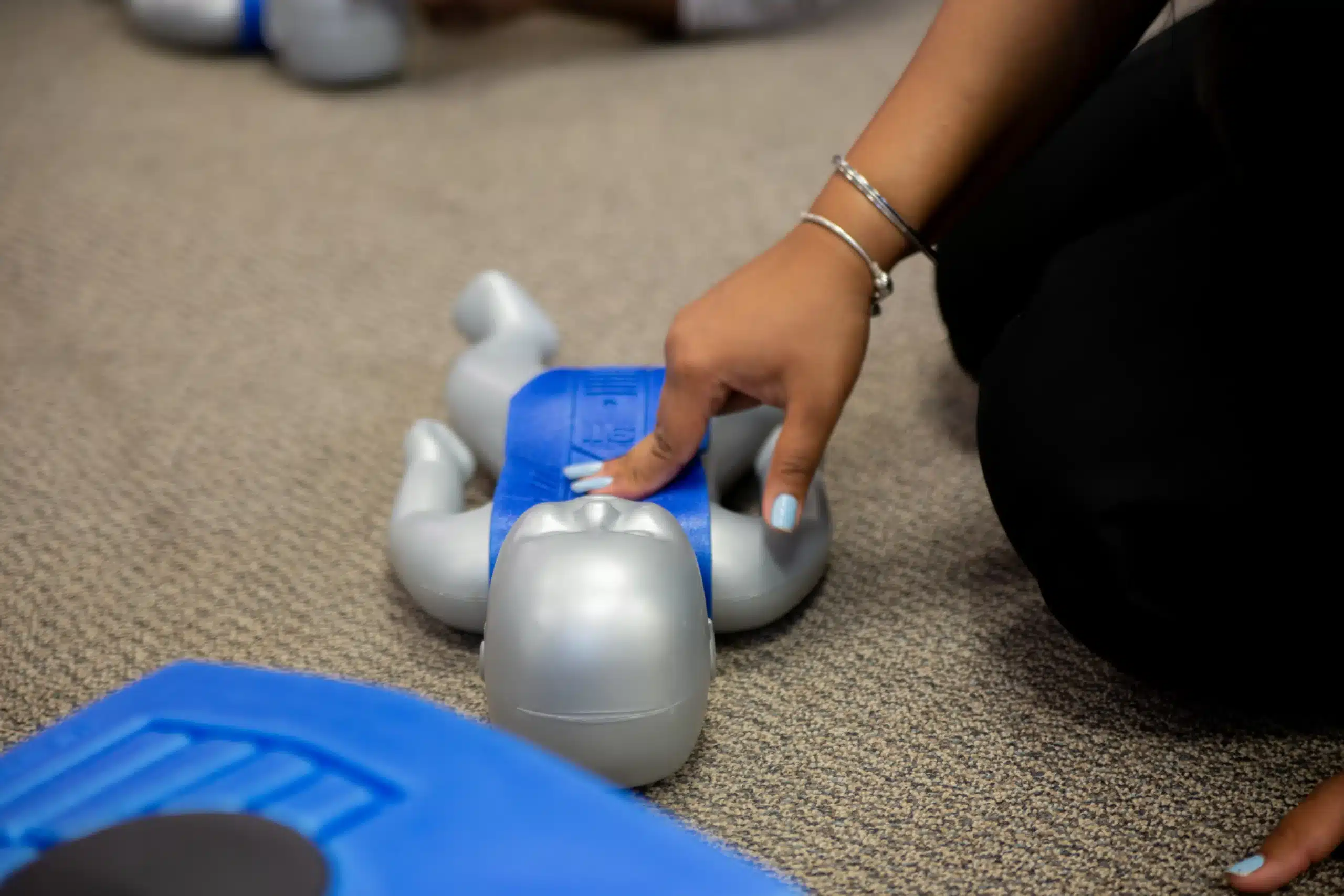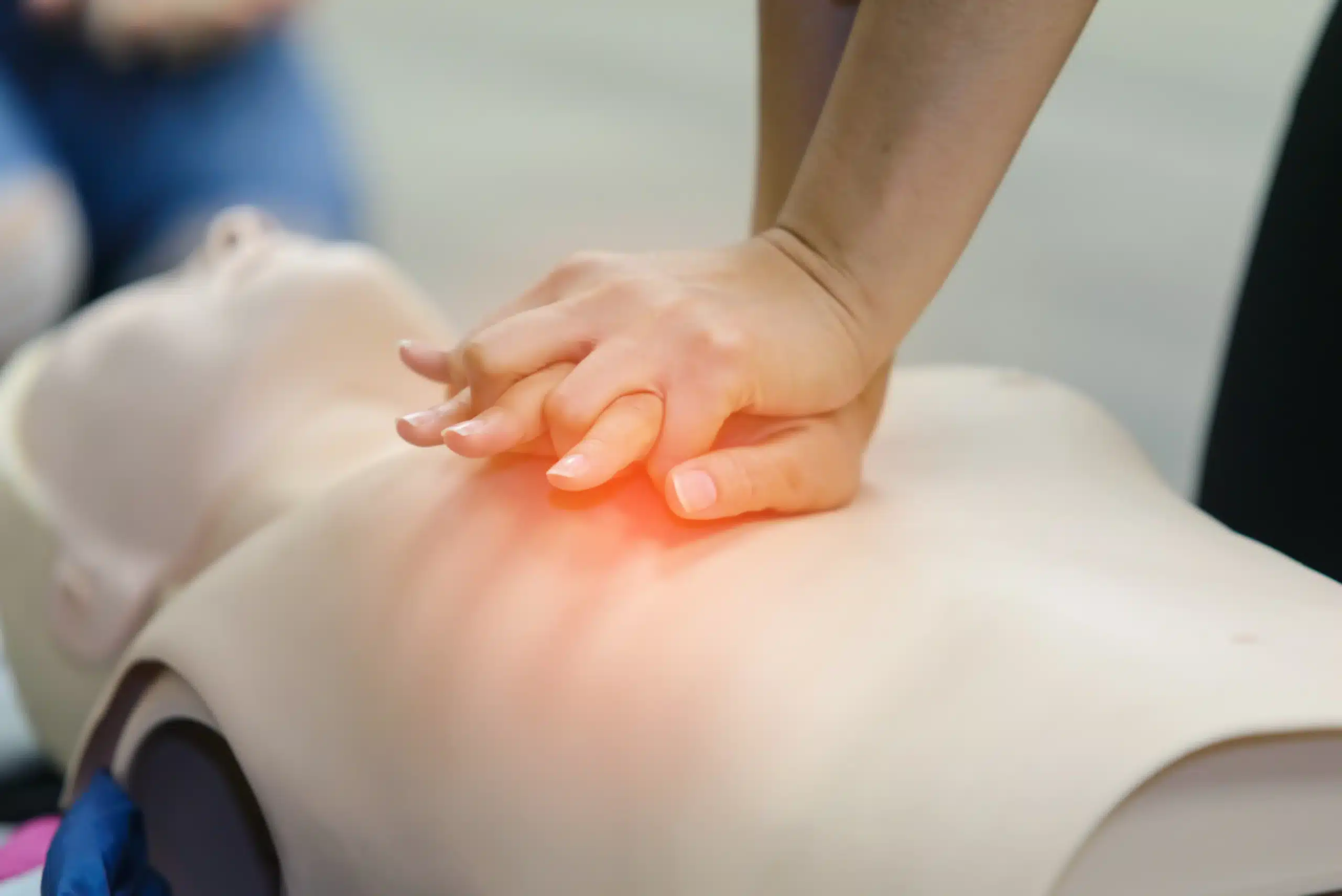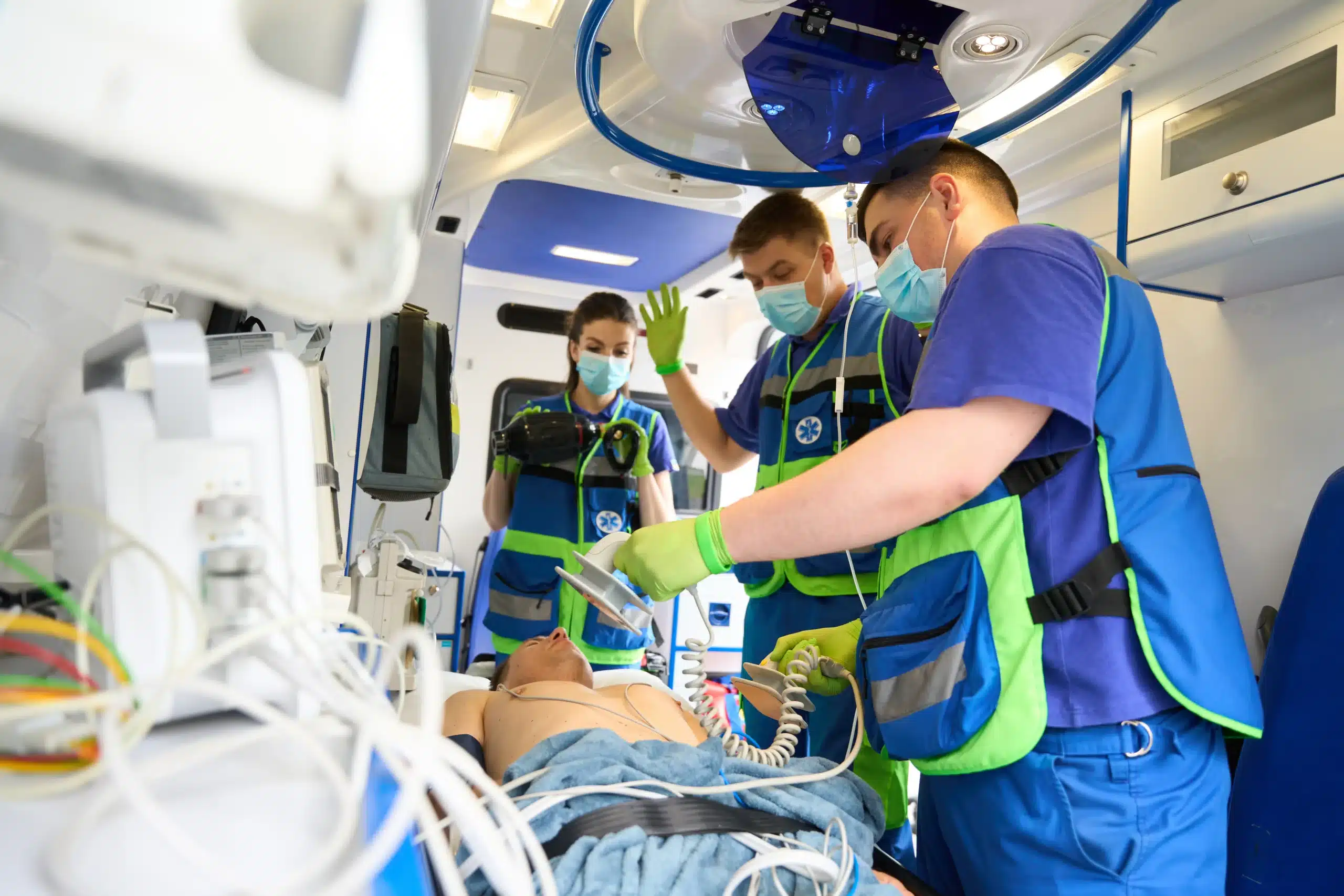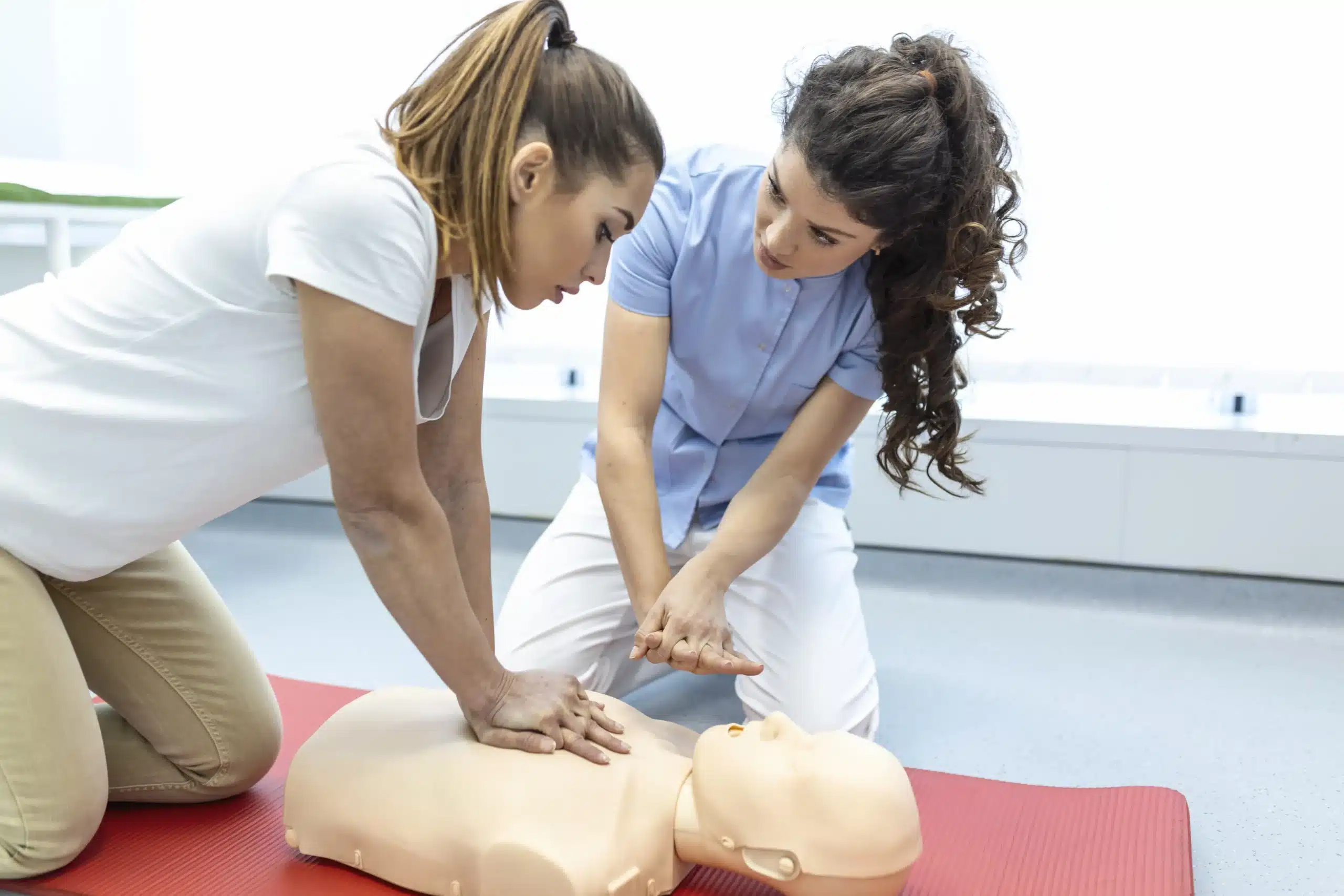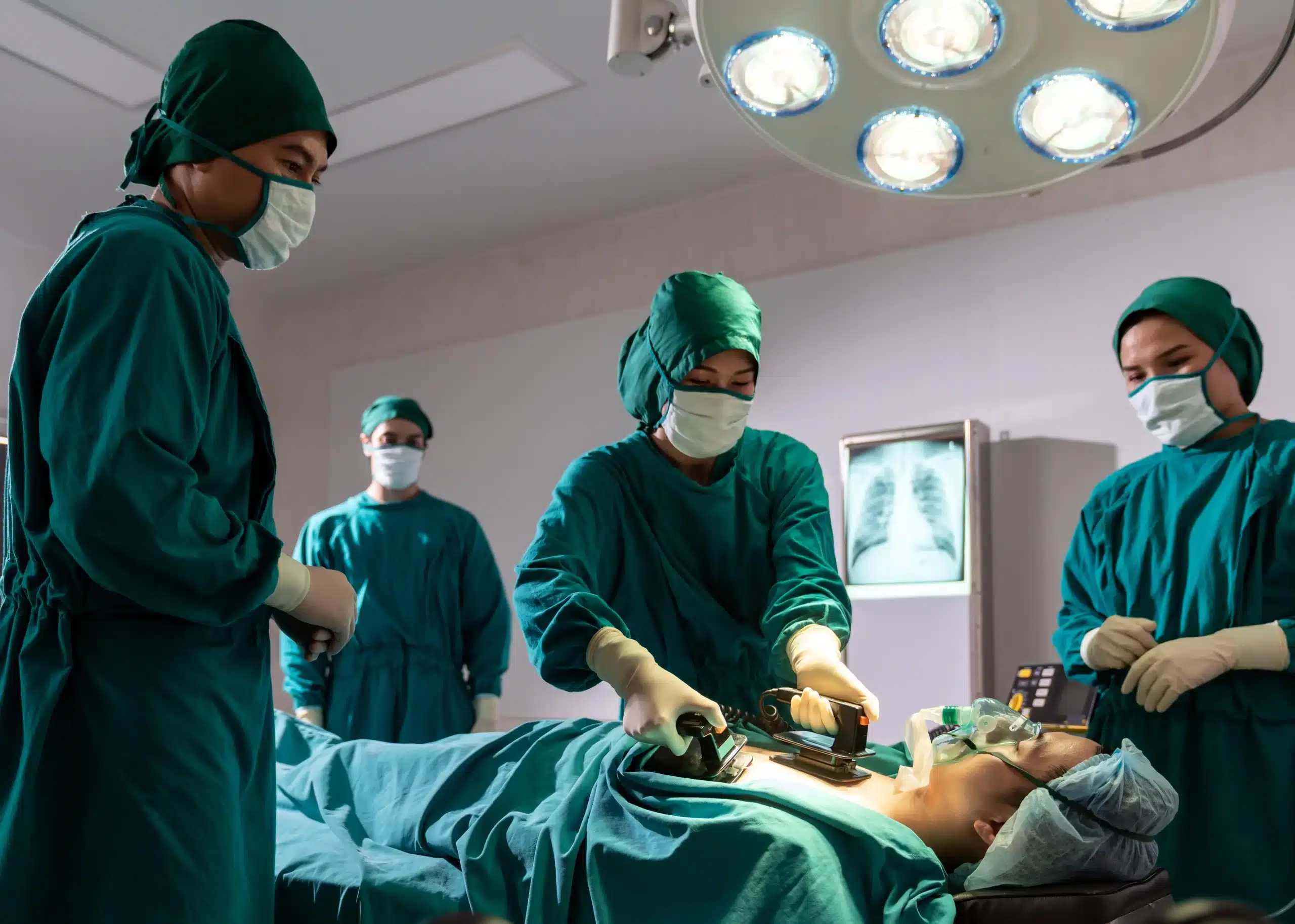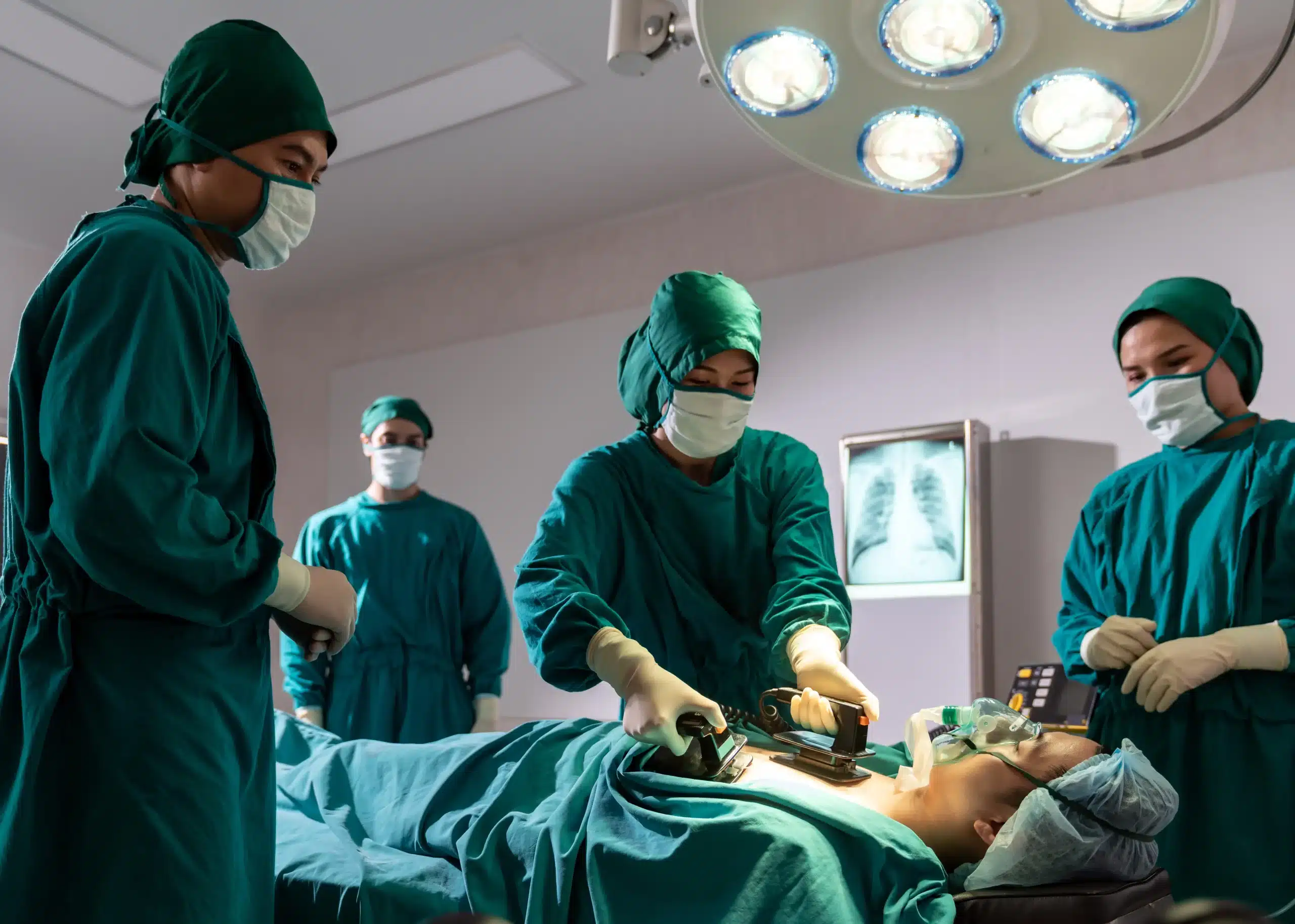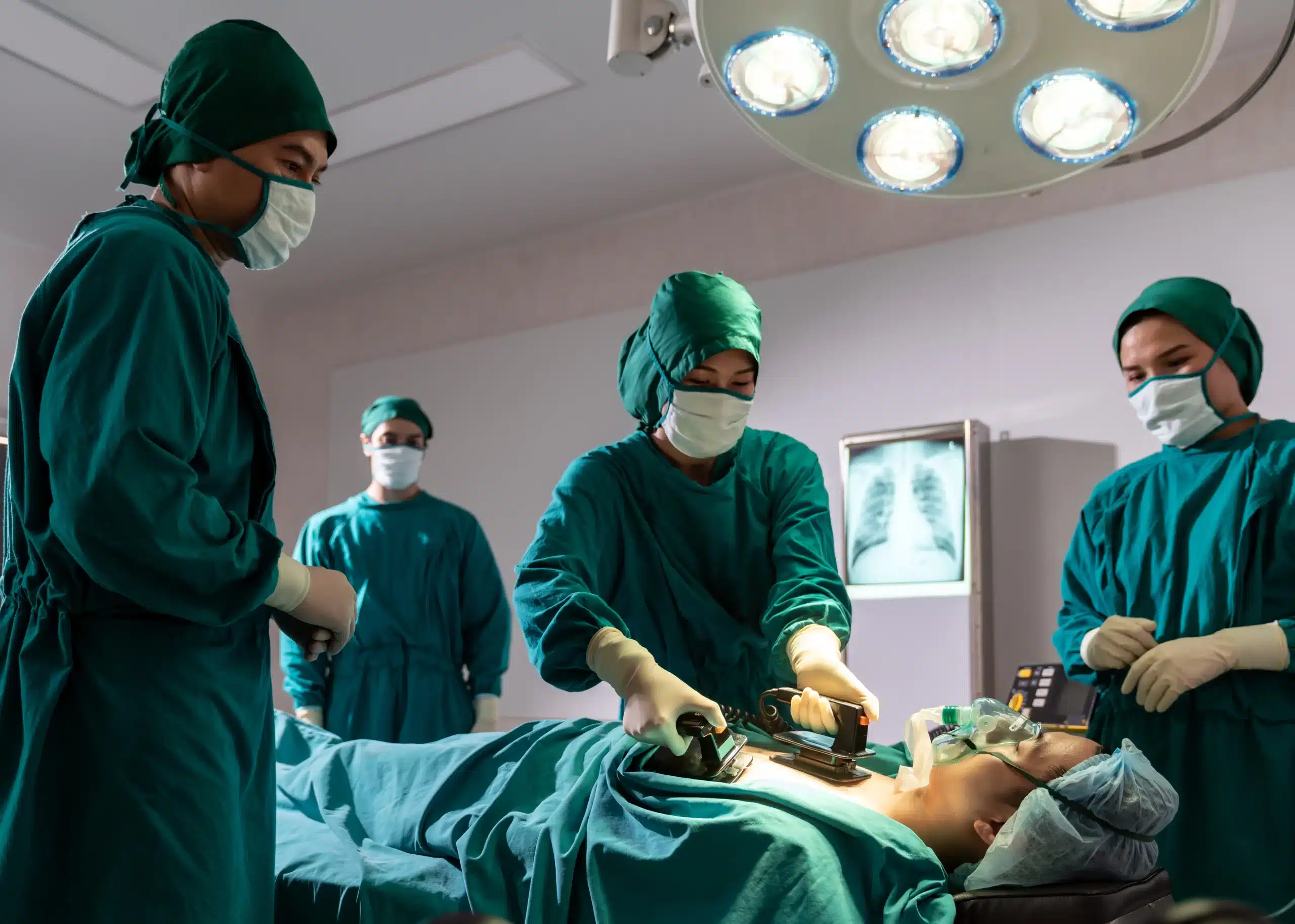CPR is a vital skill that can save lives. This guide serves as your comprehensive resource for CPR courses in Fairfax, providing detailed information on various training options, certification requirements, and the lasting impact of CPR training on the community. We’ll explore BLS, ACLS, PALS, and other specialized courses, catering to both healthcare professionals and the general public. Whether you’re looking for in-person classes, online learning, or a blended approach, this guide will help you find the perfect cpr courses in Fairfax to fit your needs and empower you to make a difference.
Key Takeaways
- CPR skills equip you to handle emergencies: Learning CPR, including chest compressions and rescue breaths, allows you to confidently respond to cardiac arrest situations, increasing the chances of survival for those in need. Find a course that suits your specific requirements.
- Different CPR courses meet various needs: Choose the right CPR course based on your role, whether you’re a healthcare provider needing BLS/ACLS/PALS or a community member wanting basic CPR and AED training. Consider course format, length, and cost.
- Regular practice keeps your skills sharp: CPR certifications typically expire after two years. Maintain your proficiency by taking refresher courses and practicing regularly, ensuring you’re always ready to respond effectively in a real-life emergency.
What is CPR? Your Fairfax Guide
Cardiopulmonary Resuscitation (CPR) is a lifesaving technique used when someone’s breathing or heartbeat has stopped. It involves chest compressions, and sometimes rescue breaths, to maintain blood flow to the brain and other vital organs until professional help arrives. This technique is crucial for victims of all ages and can significantly improve their chances of survival after cardiac arrest. Learning CPR empowers you to respond effectively in these critical moments.
CPR training equips you with the skills to provide immediate assistance. These courses cover essential techniques and best practices for various emergencies. Regular practice and refresher courses are important for maintaining your skills and confidence. Fairfax residents can find local CPR courses that offer a supportive learning environment with expert instructors and hands-on practice. This training gives you both the knowledge and the confidence to act quickly and potentially save a life.
CPR Course Types in Fairfax
Knowing which CPR course is right for you can feel overwhelming. This guide clarifies the different types of CPR training available in Fairfax.
BLS for Healthcare Providers
The Basic Life Support (BLS) for Healthcare Providers course equips medical professionals like doctors, nurses, and paramedics with the skills to respond to cardiac emergencies. This course adheres to the American Heart Association (AHA) guidelines and emphasizes high-quality CPR, including chest compressions and rescue breaths. You’ll also learn how to use an automated external defibrillator (AED) and manage choking in adults, children, and infants. For healthcare providers looking to renew their certification, San Rafael CPR Classes offers BLS renewal courses.
Heartsaver CPR
The Heartsaver CPR course is designed for anyone who wants to learn CPR—teachers, coaches, babysitters, or anyone in the community. This course teaches essential adult CPR techniques and how to use an AED. It’s a shorter course, approximately four hours, making it a practical option for those wanting to gain lifesaving skills. Find a Heartsaver course near you in our Northern California CPR directory.
ACLS
Advanced Cardiovascular Life Support (ACLS) training is for healthcare professionals who respond to cardiovascular emergencies. This advanced course covers interventions like medication administration and advanced airway management. ACLS also emphasizes teamwork and clear communication during resuscitation. San Rafael CPR Classes offers ACLS certification.
PALS
Pediatric Advanced Life Support (PALS) is designed for healthcare providers working with critically ill infants and children. This course focuses on assessing and treating pediatric emergencies, including respiratory and cardiac arrest. PALS training includes hands-on practice with realistic emergency scenarios, preparing participants to respond effectively. Learn more about our PALS courses.
CPR Course Costs & Value
Understanding CPR course costs and what you get for your money is an important part of choosing the right training. Let’s break down the different types of expenses you might encounter.
In-Person Skills Session Fees
In-person CPR training offers hands-on learning with a certified instructor. These sessions typically range in price depending on the certification level and course content. A basic two-hour course covering CPR and AED use can cost around $35 per person. Many providers, like San Rafael CPR Classes, offer group discounts, lowering the per-person cost. For example, a group of eight students might pay around $280 total, making it more affordable for workplaces or community groups to train together. Check with your chosen provider for specific group rates and minimum participants. You can often find competitive pricing through local providers.
Online Course Pricing
Online CPR courses offer a flexible learning experience. The American Heart Association (AHA) provides several online options, including eLearning and Blended Learning. AHA’s eLearning courses cover the cognitive portion of CPR training entirely online. Blended Learning combines online coursework with an in-person skills session. Pricing for these online components varies, so check the AHA website or your chosen training provider for current rates. San Rafael CPR Classes offers a variety of courses, including online and blended learning options.
Materials & Certification Costs
In addition to the course fees, factor in potential costs for materials and certification. Some providers include materials in the course fee, while others may charge separately for student manuals or pocket masks. Digital certification, like that offered by the Red Cross, provides convenient online access to your training records and certificates, often for a small additional fee. This can be valuable for keeping track of your qualifications.
Group Rates & Discounts
Group rates can significantly reduce the cost of CPR training. Contacting providers directly, like San Rafael CPR Classes, is a good way to inquire about group discounts and tailor a training program to your organization’s needs. Some providers may also offer discounts for students, seniors, or other groups, so ask about any applicable price reductions. Comparing pricing and offerings from different providers helps find the best value for your training investment.
CPR Certification: Process & Renewal
Getting CPR certified is an investment in yourself and your community. But how long does your certification last, and how do you keep your skills sharp? Let’s break it down.
Certification Duration
CPR certification is typically valid for two years. This timeframe reflects the ongoing evolution of best practices and ensures certified individuals stay current with the latest life-saving techniques. Knowing your certification period helps you plan and stay prepared. For example, if you’re a healthcare provider, maintaining a valid CPR certification is likely a job requirement. Even if it’s not required for your profession, renewing your certification demonstrates your commitment to safety and preparedness.
Renew Your Certification
Don’t let your skills lapse! Renewing your CPR certification before it expires is essential. Many organizations, like the Red Cross, offer renewal courses, often allowing recertification within a specific window before your current certification expires. This proactive approach ensures a seamless transition and keeps you ready to respond to emergencies. Check with your certifying organization for their specific renewal policies. At San Rafael CPR Classes, we make the renewal process straightforward and convenient. Our RQI program offers a flexible and efficient way for healthcare professionals to maintain their certifications.
Renewal Courses
Renewal courses are designed to refresh your knowledge and skills efficiently. They cover core CPR techniques, updates to guidelines, and any new developments in the field. These refresher courses are typically shorter than initial certification courses, focusing on the key elements you need to stay proficient. Think of it as a tune-up for your life-saving abilities. Recertification classes are a valuable way to maintain your confidence and competence in performing CPR.
Maintain Your Skills
Even between renewal courses, staying familiar with CPR techniques is crucial. Regularly reviewing the material, practicing with a friend or family member, and accessing refresher materials can help keep your skills sharp. This ongoing practice ensures you’re always ready to respond effectively in a real-life emergency. Consider adding quick practice sessions to your routine. Even a few minutes of review can make a significant difference in your preparedness. You can also explore additional resources and training options, such as our low price guarantee courses, to further enhance your skills and knowledge.
Choose Your CPR Training Format
Finding the right CPR training format depends on your learning style and schedule. Let’s break down the options so you can make the best choice for your needs. We offer in-person, online, and blended learning CPR courses in San Rafael, Corte Madera, and Fairfax, CA.
In-Person Classes
In-person CPR classes offer a hands-on learning experience guided by an expert instructor. This format allows for immediate feedback, personalized instruction, and the chance to practice your skills in a comfortable setting. You’ll work with training manikins and other equipment, building your confidence to perform CPR in real-life emergencies. In-person training is ideal for those who thrive in interactive environments and value face-to-face instruction. Plus, you’ll have the opportunity to ask questions and connect with other students. For those in and around Fairfax, the Red Cross offers convenient in-person CPR classes and certification. Our American Heart Association BLS course also follows this in-person format.
Online Courses
If you need a flexible option, an online CPR course might be a good fit. You can learn at your own pace, revisiting material as needed. Our online RQI classes are designed for healthcare professionals seeking efficient recertification. While online courses offer convenience, keep in mind that many certifications require an in-person skills session. The American Heart Association (AHA), for example, offers online CPR and First Aid courses, but participants must demonstrate their skills in person to receive their certification. This blended approach ensures you have both the knowledge and practical skills to respond effectively.
Blended Learning
Blended learning combines online learning with the hands-on practice of in-person training. You’ll complete the theoretical portion online, then attend a skills session to practice and test your abilities. This format offers a comprehensive understanding of CPR principles while accommodating busy schedules. Resources like Emergency Care highlight the benefits of blended learning for CPR certification, emphasizing the importance of the in-person skills component. This approach ensures you’re fully prepared to use your skills in a real-world scenario.
Register for CPR in Fairfax
Finding the right CPR class in Fairfax and registering is straightforward. Several organizations offer comprehensive training, including the American Red Cross and various local providers. We recommend checking Fairfax County’s website for local resources and a list of approved providers.
Registration Steps
Typically, you can register for CPR courses online. Most providers have websites where you can browse available classes, select a date and time, and complete your registration. You’ll likely create an account with the provider to manage your registration and access any online materials. San Rafael CPR Classes offers a streamlined registration process.
Required Information
During registration, you’ll usually provide basic contact information and answer a few questions about your background and experience. Some courses may have prerequisites, so reading the course descriptions is important. Reputable providers, such as those offering American Heart Association training, often provide pre-course materials to help you prepare.
Discounts & Promotions
Many CPR training providers offer discounts for groups, students, or returning customers. Check for current promotions before you register. You might find discounts on course fees or training materials. Visit our website to learn about our low price guarantee and any ongoing promotions.
CPR Course Providers in Fairfax
Finding the right CPR class can feel overwhelming, but several excellent providers serve the Fairfax area. Here’s a rundown of your options to help you find the best fit.
San Rafael CPR Classes
While based in San Rafael, San Rafael CPR Classes offers courses throughout the Bay Area, conveniently serving residents of San Rafael, Corte Madera, and Fairfax. As a woman-owned American Heart Association (AHA) Training Center, they provide various certifications, including BLS, ACLS, PALS, and First Aid. Check their website for course schedules and information on their low price guarantee. Their RQI program offers a streamlined recertification process for medical professionals.
American Red Cross
The American Red Cross is a well-known provider of CPR classes and certification in Fairfax, VA. They offer in-person classes and a blended learning option combining online coursework with an in-person skills session. The Red Cross caters to diverse groups, from individuals to healthcare providers and organizations. They also offer renewal courses and resources to help you maintain your CPR skills.
Fairfax Rescue
Fairfax Rescue offers AHA-certified CPR and First Aid training designed for different skill levels. They provide BLS courses for healthcare professionals and Heartsaver courses for the general public. These courses benefit various individuals, including parents, first responders, childcare providers, and workplace employees.
Local Hospitals & Medical Centers
Many local hospitals and medical centers in Fairfax County offer CPR and AED training. The Fire and Rescue Training Division serves as an AHA-certified Community Training Center, ensuring compliance with AHA standards. Contact hospitals near you for specific course information and schedules.
Maximize Your CPR Training
Getting ready for your CPR class and knowing what to expect helps you get the most out of your training. Here’s how to prepare, what awaits you during class, and how to keep your skills sharp afterward.
Prepare for Your Course
CPR courses at San Rafael CPR Classes are designed to be convenient, fitting into your busy schedule. Classes are short, just a few hours long, and offered in convenient locations throughout San Rafael, Corte Madera, and Fairfax. Check our website for our course schedule and find a time and location that works for you. Wear comfortable clothing suitable for hands-on practice. While we provide all the necessary training materials, you might want to bring a notebook and pen to jot down notes.
What to Expect
Our CPR classes are led by experienced, certified instructors in a relaxed and supportive learning environment. We encourage questions, so don’t hesitate to ask anything. We offer several learning formats, including traditional in-person classes and blended learning options that combine online coursework with an in-person skills session. This blended format gives you the flexibility to learn the material at your own pace online before practicing your skills with a certified instructor. Regardless of the format you choose, our goal is to give you the confidence and skills to respond effectively in an emergency. You’ll earn a two-year certification upon successful completion of the course.
Post-Course Resources
We want you to retain the valuable skills you learn in our CPR classes. We provide all participants with free refresher materials and step-by-step guides to reinforce what you learned and allow you to practice at home. For medical professionals seeking a quick and efficient way to renew their certifications, we offer RQI classes. Maintaining your CPR skills is crucial for providing effective assistance in emergencies. Regularly review the materials and consider a renewal course before your certification expires to keep your skills current and your confidence high.
Common CPR Questions
We understand you might have some questions before signing up for a CPR class. Here are some answers to frequently asked questions:
Course Formats
CPR courses are offered in several formats to fit your learning style and schedule. The American Heart Association offers online-only courses (eLearning) for those who prefer self-paced learning. If you learn best with a combination of online study and in-person practice, blended learning courses combine online modules with a hands-on skills session. Traditional in-person classes are also available. San Rafael CPR Classes offers a variety of formats, so you can choose the best option for you.
Time Commitment
The time commitment for a CPR course depends on the specific course type. Basic CPR courses can range from a few hours to a full day. More advanced courses, such as ACLS or PALS, may require a longer time commitment. Check the specific course details on our website for more information. Fairfax Rescue provides further details on course lengths for various CPR certifications.
Instructor Qualifications
Our instructors are experienced medical professionals dedicated to providing high-quality CPR training. They create a relaxed learning environment where you’ll feel comfortable asking questions and practicing your skills. Learn more about our commitment to excellent instruction and our low price guarantee.
Ongoing Support
Your learning doesn’t end when you finish the course. We offer resources and support to help you maintain your CPR skills. For healthcare professionals, our RQI program provides a streamlined way to renew your certifications. We also offer refresher courses to help you stay up-to-date on the latest CPR guidelines. The Red Cross also offers ongoing support and training programs, including specialized programs for schools.
CPR’s Impact in Fairfax
This section explores how CPR training strengthens both individual preparedness and community well-being in Fairfax. We’ll look at the benefits for everyone, from residents to healthcare professionals.
Community Benefits
CPR training creates a network of potential lifesavers within the community. When more people know CPR, it dramatically improves the odds of someone receiving immediate help during a cardiac emergency. The Red Cross emphasizes readily available CPR skills and offers resources to help maintain training through refreshers and renewal courses. This ongoing training ensures community members can act quickly and confidently in emergencies. Fairfax Rescue also supports this community-minded approach with flexible training options for various schedules and experience levels. You can even combine courses, such as First Aid and CPR, for well-rounded lifesaving skills. The City of Fairfax demonstrates its commitment to safety by placing AEDs in public areas, including municipal buildings and community gathering spots, ensuring accessibility when needed most.
Professional Development
CPR certification is often a job requirement, especially in healthcare and education. The American Red Cross offers CPR training programs for schools, equipping staff and students with skills to respond to emergencies involving children and adults. For professionals needing continuing education units, the Red Cross provides certification courses that offer CEUs, allowing nurses, social workers, teachers, and daycare providers to maintain their licensure and enhance their skills. Fairfax County’s Fire and Rescue Training Division further strengthens the professional network by acting as a Community Training Center for the American Heart Association. This designation ensures all CPR and AED training meets the highest standards, providing professionals with nationally recognized credentials.
Related Articles
- CPR Certification in San Rafael: Your Complete Guide – San Rafael CPR Classes
- Why CPR is Important in Healthcare – San Rafael CPR Classes
- RQI Training in Corte Madera: Everything You Need to Know – San Rafael CPR Classes
- ACLS Renewal in Fairfax: Your Complete Guide – San Rafael CPR Classes
- BLS ACLS PALS Training in San Rafael: A Complete Guide – San Rafael CPR Classes
Frequently Asked Questions
What are the different types of CPR courses available near me?
Several CPR courses cater to different needs. BLS for Healthcare Providers is designed for medical professionals, while Heartsaver CPR suits anyone wanting to learn basic lifesaving skills. More specialized courses like ACLS and PALS cater to healthcare providers dealing with advanced cardiovascular and pediatric emergencies, respectively. Check with providers like San Rafael CPR Classes, the American Red Cross, or Fairfax Rescue for courses offered in your area. They can guide you to the right course based on your background and goals.
How much does CPR training cost, and what does it include?
CPR training costs vary depending on the course type, format (online, blended, or in-person), and provider. In-person classes typically include instructor-led training, hands-on practice, and all necessary materials. Online or blended learning options may have separate fees for online modules and in-person skills sessions. Look for providers offering group discounts or package deals that combine CPR with First Aid training. San Rafael CPR Classes offers a low price guarantee, so comparing prices and offerings is always a good idea.
How long is CPR certification valid, and how do I renew it?
CPR certification is generally valid for two years. Renewing your certification involves taking a refresher course before your current certification expires. These renewal courses are often shorter than the initial certification course and focus on updating your skills and knowledge. Providers like San Rafael CPR Classes and the American Red Cross offer renewal courses. Check with your certifying organization for their specific renewal process and any deadlines.
What if I prefer online learning? Are there online CPR courses available?
Yes, online CPR courses offer flexibility for those with busy schedules. These courses often cover the theoretical part of CPR training online, allowing you to learn at your own pace. However, most certifications require an in-person skills session to demonstrate your practical abilities. Blended learning courses combine online modules with in-person skills practice, offering a balanced approach. San Rafael CPR Classes offers online and blended learning options, including their RQI program for healthcare professionals.
How can I find CPR classes in Fairfax, and what’s the registration process like?
Several resources can help you find CPR classes in Fairfax. Check the websites of organizations like the American Red Cross and Fairfax Rescue, or search online for local providers. San Rafael CPR Classes, while based in San Rafael, serves the broader Bay Area, including Fairfax. Registration is usually straightforward, often done online through the provider’s website. You’ll typically provide contact information, answer a few questions, and select a class date and time that works for you. Be sure to check for any prerequisites or required materials listed in the course description.
